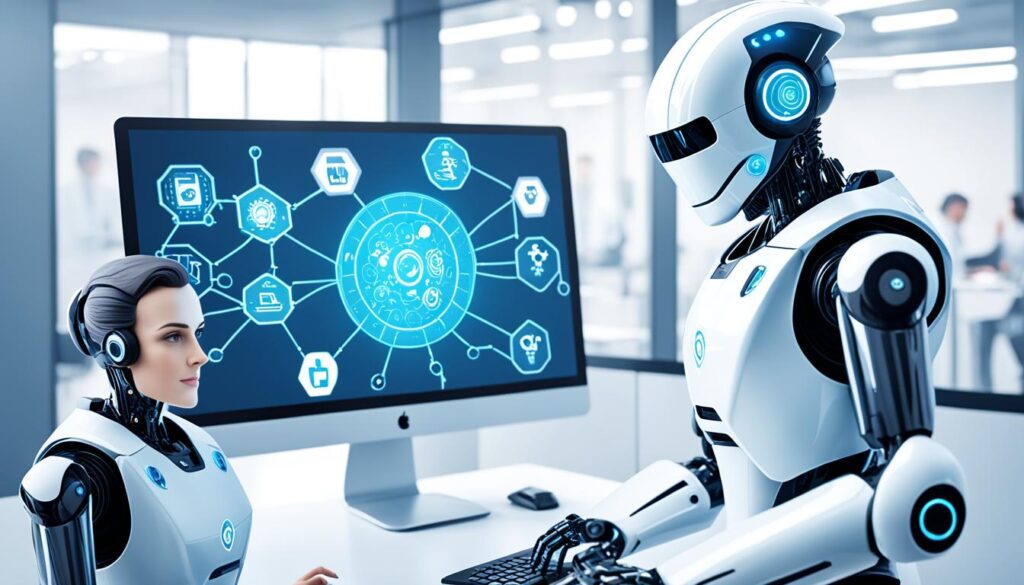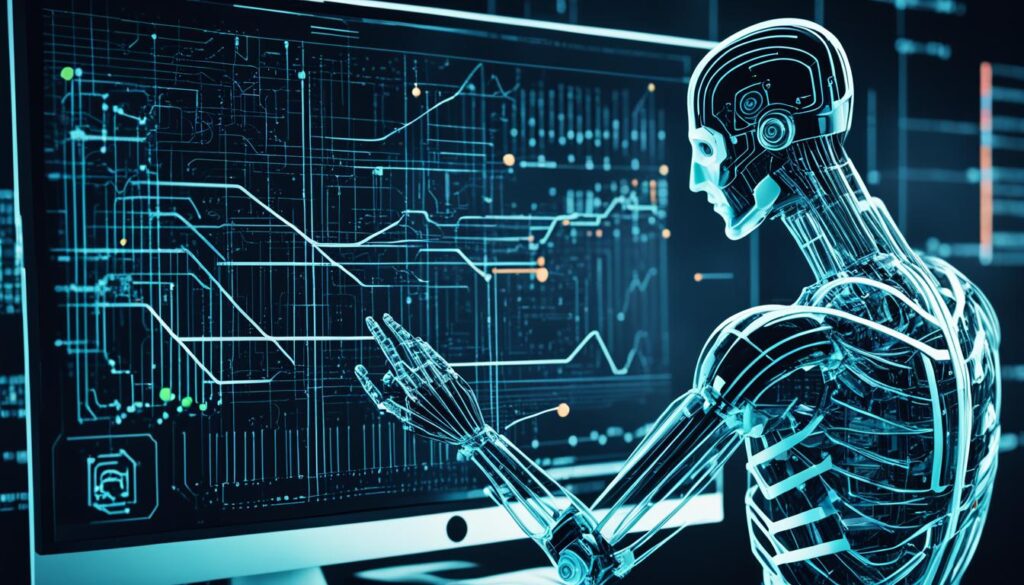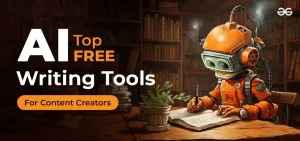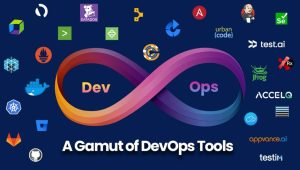Existing customer? Sign in
AI That Codes: Revolutionizing Software Development
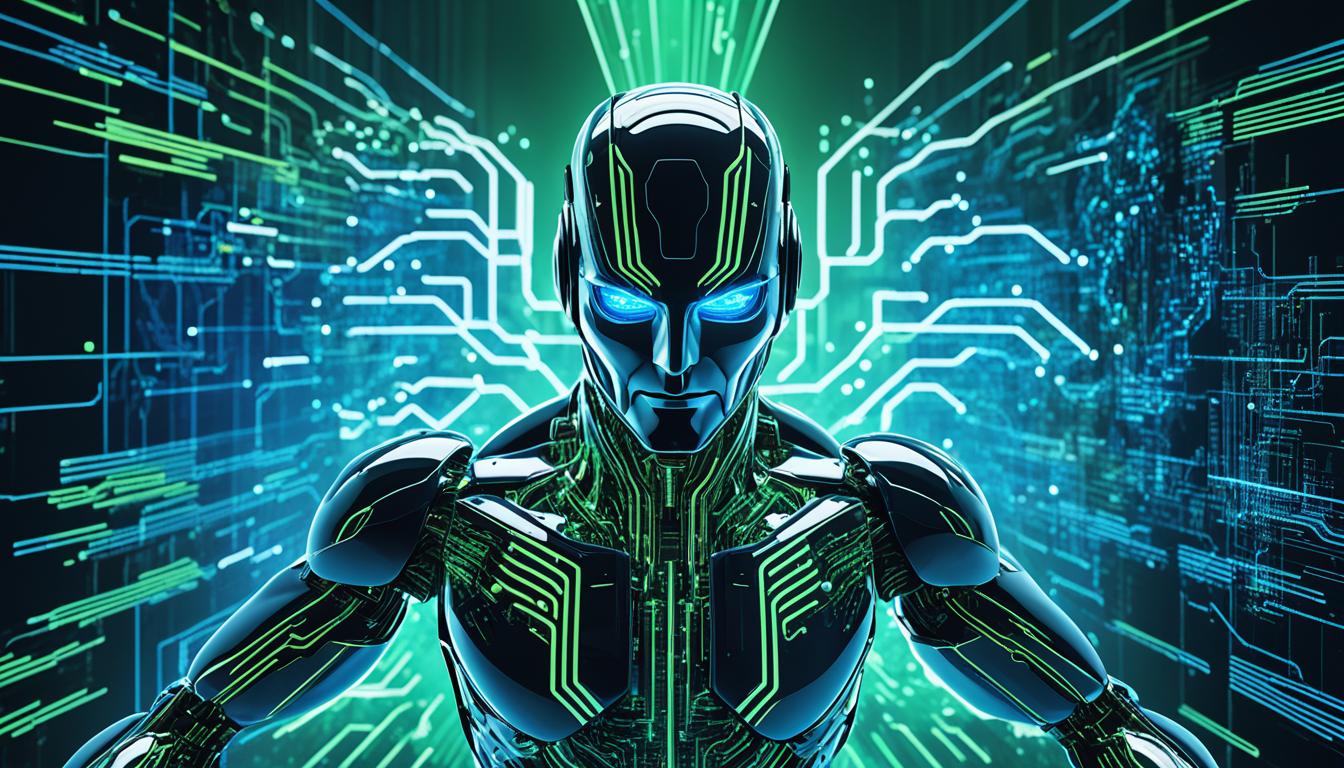
Have you ever wondered what the future of software development looks like? Can artificial intelligence programming truly transform the way we code? Is it possible for machines to generate intelligent code? Brace yourself, because the answer is here.
Artificial intelligence (AI) and machine learning have taken the world by storm, and now they’re revolutionizing the field of software development. With the emergence of AI-driven code generation, developers are witnessing a paradigm shift in the way they write code.
In this article, we will delve into the fascinating world of AI that codes. We’ll explore its historical progression, the current state of AI-powered coding tools, and the incredible impact it has on optimizing development workflows and enhancing code quality. Be prepared to be amazed by the possibilities and challenges presented by this groundbreaking technology.
Key Takeaways:
- AI-driven code generation is revolutionizing software development.
- AI-powered coding tools like OpenAI Codex and GitHub Copilot have made remarkable progress.
- AI optimizes development workflows, saving time and effort.
- AI enhances code quality through error detection, code consistency, and debugging.
- AI is involved in the entire software development lifecycle.
Emergence of AI in Coding: An Overview
As software development continues to advance, the role of artificial intelligence (AI) in coding has gained significant prominence. AI-driven code generation, also known as algorithmic coding or automated coding, has revolutionized the way developers write code. By leveraging machine learning algorithms, AI can automatically generate code snippets, scripts, or even entire programs based on input specifications or requirements, enabling faster and more efficient development processes.
The history of AI in coding can be traced back to the early days of AI research in the 1950s. However, it is in recent years that we have witnessed remarkable advancements in AI-powered coding tools. These tools have been trained on vast datasets of code repositories and programming languages, enabling them to generate accurate and efficient code that meets industry standards and best practices.
Some of the leading AI-powered coding tools in the current state of software development include OpenAI Codex, GitHub Copilot, Tabnine, and CodeT5. These tools have transformed the way developers work by providing intelligent suggestions, code completions, and accurate predictions, reducing the time and effort required to write code.
What is AI-Driven Code Generation
AI-driven code generation refers to the use of machine learning algorithms to automatically generate code based on input specifications or requirements. It utilizes techniques such as natural language processing and deep learning to analyze patterns and generate code that adheres to coding conventions and best practices. With AI-driven code generation, developers can save time and effort by automating repetitive and mundane coding tasks, allowing them to focus on higher-level problem-solving and innovation.
Historical Progression of AI That Codes
The history of AI in coding dates back to the early days of AI research in the 1950s. Initially, AI was primarily focused on developing rule-based systems for solving specific coding problems. Over time, advancements in machine learning and neural networks have paved the way for more sophisticated AI-powered coding tools. These tools have evolved to analyze large-scale code repositories, learn from patterns, and generate code that not only meets functional requirements but also adheres to coding conventions and best practices.
Current State of AI-Powered Coding Tools
The current state of AI-powered coding tools is characterized by remarkable progress and innovation. Tools like OpenAI Codex and GitHub Copilot are trained on massive datasets of code repositories, enabling them to provide accurate and context-aware code completions, suggestions, and even entire code snippets. These AI-powered tools have significantly enhanced coding efficiency and collaboration among developers, enabling them to write code faster, with fewer errors, and with higher quality. The integration of AI with coding workflows has the potential to revolutionize software development and propel it into a more efficient and productive future.
Optimizing Development Workflows with AI
AI plays a vital role in optimizing development workflows, significantly improving the efficiency of software development processes. By harnessing the power of artificial intelligence, developers can automate repetitive tasks, allowing them to focus their time and effort on implementing core functionality and logic.
One of the key ways AI optimizes development workflows is through the automation of tasks such as generating boilerplate code and code refactoring. These are essential yet time-consuming activities that often require significant manual effort. By leveraging AI-powered tools for code generation and refactoring, developers can streamline these processes, saving valuable time and resources.
Furthermore, AI facilitates rapid prototyping and iteration, enabling developers, designers, and stakeholders to collaborate more effectively. AI-powered tools provide intelligent suggestions and predictions, aiding in the creation of prototypes, reducing development cycles, and enhancing overall productivity.
With AI’s ability to automate repetitive tasks, developers can overcome common bottlenecks in the software development lifecycle. This leads to increased efficiency, faster development cycles, and improved delivery timelines. By optimizing development workflows with AI, software organizations can achieve higher productivity and ultimately deliver more robust and innovative solutions.
“AI optimization of development workflows is a game-changer in software development. It saves time, reduces manual effort, and enables teams to focus on building high-quality code and delivering exceptional software.”
With AI-driven code generation and intelligent automation, software development teams can streamline their processes and achieve higher levels of efficiency. By harnessing the power of AI, organizations can unlock significant productivity gains while ensuring that their development workflows are optimized for success.
Enhancing Code Quality Through Intelligent Automation
When it comes to software development, code quality is of utmost importance. Poorly written code can lead to bugs, security vulnerabilities, and maintenance issues. This is where AI comes in, offering intelligent automation solutions to enhance code quality and improve overall development processes.
Improving Accuracy with AI-Assisted Error Detection
One of the key benefits of AI in software development is its ability to assist in error detection. AI-powered tools can analyze code in real-time, identifying bugs and potential errors. This proactive approach allows developers to address issues early on, improving the accuracy of the code and reducing the likelihood of bugs slipping through the cracks.
AI-assisted error detection goes beyond simply identifying syntax errors. It can also detect logical errors, performance issues, and security vulnerabilities, providing developers with actionable insights to enhance their code.
Fostering Code Consistency Across Teams
In large development teams, maintaining code consistency can be challenging. However, AI can help enforce coding conventions, style guidelines, and best practices across the entire team. By analyzing code and providing suggestions, AI-powered tools ensure that the codebase remains consistent and cohesive.
By fostering code consistency, AI enables better collaboration and smoother integration of code. It also enhances maintainability and scalability, as developers can easily navigate and understand each other’s code.
The Role of AI in Debugging and Security
Debugging is an essential part of software development, and AI can significantly speed up the process. AI-powered tools can analyze code, pinpointing the source of bugs and suggesting fixes. This accelerates the debugging cycle and allows developers to deliver high-quality code more efficiently.
Furthermore, AI plays a vital role in enhancing security. By analyzing code for potential vulnerabilities, AI can identify security risks and provide recommendations to strengthen the software’s defenses. This helps developers build secure and robust applications.
| Benefits of AI-Assisted Error Detection and Code Consistency | Impact on Code Quality |
|---|---|
| Proactive identification of bugs and errors | Improved accuracy and reliability |
| Consistent adherence to coding conventions | Enhanced maintainability and scalability |
| Efficient debugging process | Higher-quality code |
| Enhanced security through vulnerability detection | Stronger defense against potential threats |
AI That Codes: From Ideation to Execution
Artificial intelligence (AI) is revolutionizing the entire software development lifecycle, playing a crucial role from ideation to execution. With the advent of AI-powered tools, developers now have access to a range of functionalities that streamline the coding process and enhance productivity.
When it comes to software ideation, AI-powered tools can assist in generating code prototypes based on various inputs such as design mockups, user stories, or requirements documents. By leveraging machine learning algorithms, these tools analyze the provided information and generate relevant code snippets or scripts, providing developers with a head start in the development process.
But AI’s impact doesn’t stop at the ideation phase. During code execution, AI can significantly improve coding efficiency and productivity. AI-powered tools offer code completion and suggestions, reducing the time spent on manual coding tasks. These intelligent suggestions not only enhance accuracy but also help developers write code faster, speeding up the overall development process.
Integrating AI into the development workflow creates a powerful synergy between human creativity and machine learning capabilities. By harnessing AI’s potential, developers can streamline the entire software development lifecycle, optimizing ideation and execution for improved efficiency.
Unlocking the power of AI in software ideation and code execution holds immense potential for transforming the development lifecycle. With intelligent automation and code generation, developers can focus their time and energy on solving complex problems and driving innovation.
AI-powered development tools provide developers with a competitive edge. They streamline the coding process, optimize development workflows, and enhance code quality, ultimately enabling teams to deliver high-quality software in less time.
To better understand the impact of AI in software development, let’s explore a comprehensive table highlighting key aspects of AI that codes, from ideation to execution.
The table above provides an overview of the AI-powered development lifecycle, showcasing how AI can be utilized in different stages of software development. From generating code prototypes to improving coding efficiency, AI brings a range of benefits to the development process.
As the software development industry continues to evolve, AI-driven development will play an increasingly significant role, shaping the future of coding and software engineering.
Challenges and Future Directions in AI-Enabled Coding
AI-enabled coding presents both unique challenges and exciting future directions in the field of software development. As the reliance on AI code generation increases, developers face the complexities of ensuring accuracy and reliability in the produced code. Addressing these challenges is crucial to unlock the full potential of AI coding.
Addressing the Complexities of AI Code Generation
One of the major challenges in AI-enabled coding is the intricate nature of code generation. AI models need to be trained on vast amounts of diverse and high-quality code repositories to generate accurate and efficient code. The complexities of understanding and implementing various programming languages, frameworks, and libraries add another layer of difficulty. Additionally, ensuring that the generated code aligns with the desired functionality and specifications requires continuous refinement and improvement.
Developers and AI researchers are actively working on overcoming these complexities by refining AI algorithms, training models on larger and more diverse datasets, and leveraging advanced natural language processing techniques. The goal is to create AI-powered coding tools that can generate code with high precision and adaptability, reducing the burden on developers and streamlining the development process.
Potential Ethical Concerns and Intellectual Property Rights
With the advancement of AI in coding, it is essential to address potential ethical concerns and intellectual property rights. Plagiarism, the unauthorized use of code snippets, and the protection of proprietary code are important considerations in AI coding. Striking a balance between leveraging AI for code generation and respecting intellectual property rights remains a significant challenge.
Data privacy is another critical aspect to consider in AI-enabled coding. AI models require access to large datasets of code to train effectively. However, ensuring the privacy and confidentiality of sensitive or proprietary code can be a complex task. Safeguarding data and implementing robust security measures are crucial to maintain trust and confidence in AI coding platforms.
Upcoming Innovations in AI Coding Platforms
The future of AI coding platforms holds exciting innovations that can further enhance the efficiency and productivity of software development. Advancements in natural language processing will enable more intuitive and human-like interactions with AI coding tools, making it easier for developers to express their ideas and intentions.
Integration with DevOps practices is another promising direction in AI-enabled coding. Seamless integration of AI tools into the development workflow can automate tasks like code review, testing, and deployment, fostering collaboration and accelerating the software development life cycle.
Customization options are also expected to play a significant role in the future of AI coding platforms. Tailoring AI models to specific programming languages, frameworks, or project requirements will empower developers to harness the full potential of AI code generation in their unique contexts.
As AI continues to shape the future of coding, addressing challenges, navigating ethical considerations, and embracing innovative advancements are key to maximizing the potential of AI-enabled coding. By leveraging the power of AI, developers can overcome obstacles, enhance code quality, and unlock new possibilities in software development.
Conclusion
The integration of Artificial Intelligence (AI) in coding is revolutionizing software development in remarkable ways. By leveraging AI, developers are able to automate repetitive tasks, improve code quality, and enhance overall efficiency.
One of the significant benefits of incorporating AI in coding is the ability to accelerate development cycles. AI-powered tools can automate the generation of code, saving precious time in the software development process. Moreover, the use of AI in coding helps improve code accuracy, reducing errors and enhancing the reliability of the final product.
AI’s impact goes beyond time-saving and accuracy. By automating mundane coding tasks, developers can focus more on innovation and problem-solving. This ability to shift their energy towards finding creative solutions and pushing boundaries enhances not only the development process but also the final product.
The future of coding holds immense possibilities as AI technology continues to advance. Exciting innovations, collaborations, and creative breakthroughs are on the horizon. With the continued integration of AI in code generation, software developers can expect even greater advancements, empowering them to build superior applications that meet the evolving needs of users and businesses alike.
FAQ
What is AI-driven code generation?
What is the historical progression of AI in coding?
What are some examples of current AI-powered coding tools?
How does AI optimize development workflows?
How does AI enhance code quality?
How does AI contribute to software ideation and code execution?
What are the challenges and future directions in AI-enabled coding?
What are the benefits of AI in coding?
Source Links
- https://nandbox.com/the-future-of-coding-how-ai-is-revolutionizing-programming/
- https://www.linkedin.com/pulse/how-ai-code-generation-revolutionizing-software-processes-pandya-2mwjf?trk=article-ssr-frontend-pulse_more-articles_related-content-card
- https://www.appypie.com/blog/ai-code-generation-models
